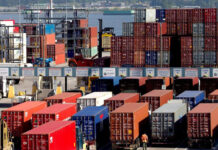The government is spending Rs 131.619 million for the appraisal of huge coal reserves confirmed by the Geological Survey of Pakistan (GSP) in 2014 after two years of extensive drillings.
“Rs131.619m will be used for the appraisal of the newly discovered coal resources in Badin and its adjoining areas of Southern Sindh,” official sources in the Ministry of Petroleum and Natural Resources told APP.
According to the GSP, they said the coal deposits were estimated to be over 1 billion tonnes. “The coal is of good quality and high heating value.”
Besides, the sources informed that there were substantial deposits of gold, copper and more than 200m tonnes of iron ore but these could not be exploited or utilised because of lack of infrastructure and technology.
They said efforts were also being made for exploration of tertiary coal in Central Salt Range, Punjab, aimed at meeting the growing domestic energy demand and to develop coal fields and an increase in power generation.
The sources said exploration of oil, gas, minerals and coal resources was undertaken on regular basis which contributed significant discoveries, especially in the oil and gas sectors.
Recent geological investigations have shown that 185 billion tonnes of coal reserves exist in different parts of the country, which could be used as a primary and inexpensive source for power generation.
“More than 184b tonnes deposits are located in Sindh, with Thar coal field being the largest followed by Thatta-Sonda, Lakhra and Jhimpir.
Coal is primarily classified into four major categories: lignite, sub-bituminous, bituminous and anthracite.
The sources informed that further steps were being carried out to explore and evaluate coal deposits in Musakhel, Kingri and Toisar Basin, Balochistan.
Answering a question, they said the mining and quarrying sector grew by 0.6 percent in 2015-16. “Estimates suggest there are copper reserves of 1.9 b tonnes and 11.2m ounces of gold in different localities.”
They admitted that the primary reason for not getting maximum benefit of these natural resources was the application of out-dated technologies, poor management and inadequate capital besides security situation in some areas where the bulk of the mineral resources were located.
The mineral sector of Pakistan is spread over 600,000 square kilometres and 92 known minerals, of which 52 are commercially exploited.
Presently, the sources said above 5,000 operational mines and 50,000 small and medium enterprises were producing an average 68.52m tonnes per year and providing direct employment to 300,000 workers.


























ager badin men gold he tu usko nekala kyon nhe jata